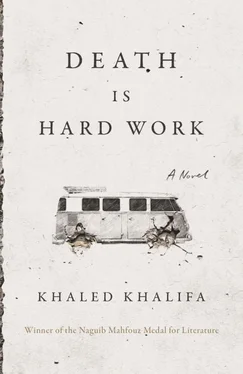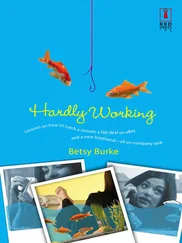Abdel Latif didn’t dare to be frank about his feelings, much less his ambition to marry her. He lay awake at night, feeling as though he were drowning in a gray and indescribable space, somewhere between love and desire. There in S, everyone was a villager, each about the same as the others, but Nevine was the exception—her every quality struck him as entrancing: her beautiful voice when she sang old Iraqi songs, and her great kindness, made her seem like a leaf in an autumn gale.
The first three months after they met had been the most difficult for Abdel Latif. He was always trying to hint to Nevine how he felt about her: to signal all his pleasure and fear. True, he had trouble believing that this girl who taught three days a week and spent the rest of her time in art school was really as innocent as she looked, but he didn’t care. He believed that she liked him back, but was too anxious to find out for sure, and so went on loving her silently and sleeplessly.
He went to Anabiya as usual to spend the fortnight’s holiday with his family, who no longer objected to his choice to live so far away from them—indeed, for years now his family had done its best to make him feel welcome and tiptoed around any subject that might annoy or enrage him. The subject of his sister Layla was closed—the family no longer mentioned her at all. Her story might be too painful to be forgotten, but everyone was willing to try. They conspired to efface it by concocting fairy tales to cover the truth, relying on the sound principle that if you really want to erase or distort a story, you should turn it into several different stories with different endings and plenty of incidental details. They said, for example, that Layla had committed suicide because she suffered from incurable leprosy or that she was hideous and had been concealing a congenital defect since birth, and the legend that she had been a beautiful girl was a lie. The most horrible story is always the one that people believe, in the end, but nevertheless, the truth never dies, even if its voice is so faint no one can hear it. The true story was perfectly clear to those with ears to hear it: Layla was beautiful and strong-willed, and she refused to accept the humble, cringing life others had chosen for her. Instead, she had made a choice of her own—to die.
Abdel Latif returned from his holiday firmly convinced that Nevine wasn’t some brief infatuation. Her smile had never left him for a single instant. He felt like a man who not only hadn’t caught the bouquet floating down the river but had dived into the river’s depths and drowned. He resolved to make a clean breast of all this to her after his return to S and was therefore somewhat taken aback to find that his dear friend Najib Abdullah had married Nevine while he was away.
Without preamble, Najib had gone to Muhassan with his whole family in tow and asked Nevine’s family for her hand. Everything was settled without difficulty. They were married, and Nevine moved into her husband’s house in the middle of his family’s large estate. Everything was as it should be, apart from Abdel Latif’s suffering, which accumulated in devastating silence. Nevine was the only one who ever caught the least sign of that suffering, especially during the big party the couple threw to celebrate their marriage. Abdel Latif couldn’t hide his longing for her, nor his overwhelming regret at being too late to have caught the bouquet. She ignored him then, and it was years before she sought him out to lessen the torments of this man who had loved her for so long.
Everything was concluded without fuss. Despite her unhappiness in her marriage, she never admitted to having made a mistake she, too, would silently regret. She’d known that Abdel Latif wasn’t the man for her; she liked him well enough, but not enough to marry and live with him. For several months after her wedding Abdel Latif did nothing, and remained alone, striving to get over his wound. He avoided Nevine and made excuses whenever his friend Najib Abdullah invited him around—Najib, who never even noticed that he’d stolen the girl his friend hoped to marry. But then there was a lot Najib didn’t know: he was also unable to see that he was living with a woman who dreamed strange dreams and possessed a sensitivity so exquisite as to be excessive. To Najib, everything was normal; his mother had pointed this woman out, so he broached the topic of marriage with her, and Nevine didn’t refuse. Everything was soon over and done with, and life went on smoothly and happily. It wasn’t long before monotony imposed the rhythm of forgetfulness on everyone but Abdel Latif. Her perfume, even at a distance, still stirred him, her walk dazzled him, and at times her penetrating eyes threatened to destroy his defenses and expose his weakness. Nevine forgot all about her own art; she became a normal mother and teacher, accepting the duties of her lot without complaint. Within a few years she was like all the other women of S; she never used her beautiful voice, forgot her Iraqi songs, and even lost her sweet accent, which now only slipped out on rare occasions.
Bolbol found it all hard to believe. He just couldn’t think of his father as a lonely, unrequited lover. At last he understood the secret of Abdel Latif’s love for Iraqi songs! For whenever Nevine abandoned something from her past, Abdel Latif reflexively picked it up and kept it, polishing it anew and storing it in some remote corner of his life. He kept many of Nevine’s old paintings, dusting them off and rescuing them from decay where they had been left in the school storeroom. And yet, despite everything, this same supposedly sensitive man berated Bolbol bitterly when the latter slunk back to the family seat after his divorce, the bereaved man showing a cruelty in the midst of his grief that Bolbol found unbearable.
This return to the family home was supposed to lighten the suffering of both the widowed father and the divorced son. Lamia, when she visited them, couldn’t bear to see Abdel Latif so bereft as he marked five years after his wife’s death. He wouldn’t indulge her suggestion of taking him back to her village for a long visit, even though she declared with enthusiasm that it was more than fitting given the closeness of their friendship, adding that a long visit would delight Zuhayr and their two children, too, and that perhaps Abdel Latif could help her revive her parsley. He just looked at her and smiled, then went off to prepare dinner. He told her, “When your beloved goes away, they take the keys of happiness with them and throw them into that deep pit known as the grave.” His wife hadn’t left him any happiness, he said, but had taken everything with her: sleep, the secrets of cooking, their morning coffees together and evening walks through the town. Now he was abandoned, alone, waiting to die—she had taken everything with her. Not that he told Lamia about his depression—and he’d never told anyone that it had been forty years since he had last tasted happiness, on that holiday to Anabiya when he was dreaming about Nevine. No, for him, everything was finished. His memories of his wife were a simile, so to speak—an interregnum, no more, resembling love—before he could be with his true beloved. So much time had passed, and Nevine was still surprised by Abdel Latif’s occasional furtive glances; most oddly, in recent years these glances had begun to break through her reserve, leaving her bewildered. From her depths, pleasant feelings surfaced that she couldn’t describe.
Surrendering to one’s memories is the best way of escaping the wounds they preserve; constant repetition robs them of their brilliance and sanctity. So as the minibus was leaving the checkpoint at Z, that’s just what Bolbol did, swamped with pain as he was, feeling as though he were sinking into the earth… The morning was serene, and a peculiar silence had settled after a night of intense bombardment, but they knew it wouldn’t last the closer they got to the zones where the fighting had been at its most intense for two and a half years. The opposition forces had captured the principal roads, weakening the regime forces and threatening their supplies of fuel and wheat… Bolbol tuned out and once more revisited his father’s last nights in his house. Abdel Latif had been exhausted and overcome with pain; he knew he wouldn’t survive, and again a vehement desire to die seized him and never left him.
Читать дальше












